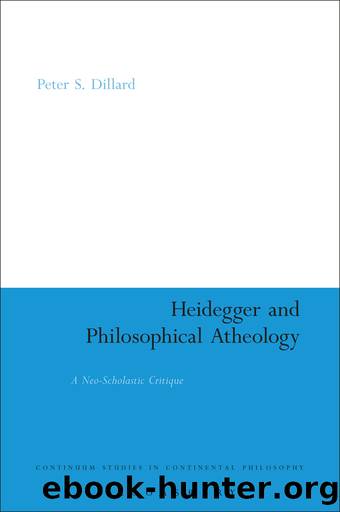Heidegger and Philosophical Atheology by Dillard Peter S.;

Author:Dillard, Peter S.;
Language: eng
Format: epub
Publisher: Bloomsbury Publishing Plc
Published: 2008-10-14T16:00:00+00:00
Narrowing the focus
Although the writings from Heideggerâs middle period donât establish the cosmic negative existential, there may be grounds for a more limited antimetaphysical result aimed at the kind of Scholastic natural theology discussed in Chapter 3. Here it is helpful to leave behind the dubious phenomenological assertions in Being and Time concerning Daseinâs ânullityâ and return to the threads left hanging by Heideggerâs atheology of Appropriation.
Heidegger develops that atheology partly in response to his early quest for a phenomenologically substantive account of being. By identifying being as such with the sequence of historicized transcendentals, the concept of being is rescued from barren abstraction. For these transcendentals are precisely the ways beings in general have âshown upâ or been disclosed to humans in the history of the West. Philosophically conscious humans can also become aware that a particular transcendental, such as that of standing reserve, dominates or âholds swayâ over the epoch in which they live. Thus in the place of a system of empty and bloodless classifications, we have a cosmic affair complex or a protracted cosmic event the various dispensations of which are endowed with rich experiential content.
Heidegger further analyzes this protracted cosmic event as containing two main constituents or, in Scotist terms, instants of nature: Appropriation and the actual sequence of historicized transcendentals It âsendsâ through which beings are disclosed in accordance with the dimensions of true time. In Its very nature Appropriation is a sending that depends on there being some history of being, though not necessarily the actual one, an atemporal potentiality that may be actualized in a number of possible ways. The actual history of being structured by temporal dimensions is noncausally explained in terms of the sending of Appropriation, but nothing explains this sending itself.
Using the example of the sending of history of being by Appropriation, the Heideggerian atheologian can press a specific objection against Scholastic metaphysics epitomized by the Causal Argument for a First Explanatory Being. The Causal Argument assumes that every contingent event, even if it is uncaused, can be caused. Clearly, Appropriationâs sending of the history of being is contingent, since it may not have happened at all (so that there would have been no Appropriation) or may have happened differently (so that there would have been another sequence of historicized transcendentals). Furthermore, Appropriationâs sending of the history of being cannot be caused. For any possible cause of it would either be a happening in the history of beingâin which case we have the absurdity that the history of being is already unfolding before itselfâor it would be an atemporal cause that is totally self-disclosedâin which case we have the absurdity that being qua disclosure is âexplainedâ by being qua disclosure. In embracing a view of ultimate reality as a radically contingent, uncausable sending of being/time by Appropriation, the Heideggerian atheologian hopes to overcome the view that there is a First Cause of all contingent being.
However, we saw that the atheology of Appropriation hits a snag. Precisely because Appropriationâs essential
Download
This site does not store any files on its server. We only index and link to content provided by other sites. Please contact the content providers to delete copyright contents if any and email us, we'll remove relevant links or contents immediately.
The remains of the day by Kazuo Ishiguro(7551)
Tools of Titans by Timothy Ferriss(6950)
The Black Swan by Nassim Nicholas Taleb(6192)
Inner Engineering: A Yogi's Guide to Joy by Sadhguru(5897)
Giovanni's Room by James Baldwin(5879)
The Way of Zen by Alan W. Watts(5800)
The Six Wives Of Henry VIII (WOMEN IN HISTORY) by Fraser Antonia(4791)
The Power of Now: A Guide to Spiritual Enlightenment by Eckhart Tolle(4756)
Astrophysics for People in a Hurry by Neil DeGrasse Tyson(4620)
Asking the Right Questions: A Guide to Critical Thinking by M. Neil Browne & Stuart M. Keeley(4576)
12 Rules for Life by Jordan B. Peterson(3734)
The Ethical Slut by Janet W. Hardy(3504)
Skin in the Game by Nassim Nicholas Taleb(3462)
Housekeeping by Marilynne Robinson(3402)
The Art of Happiness by The Dalai Lama(3385)
Double Down (Diary of a Wimpy Kid Book 11) by Jeff Kinney(3275)
Skin in the Game: Hidden Asymmetries in Daily Life by Nassim Nicholas Taleb(3264)
Walking by Henry David Thoreau(3235)
12 Rules for Life: An Antidote to Chaos by Jordan B. Peterson(3204)
